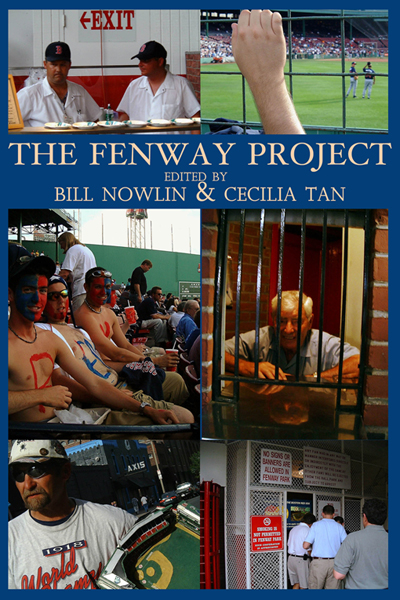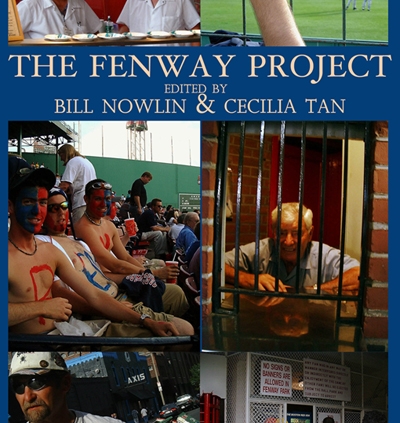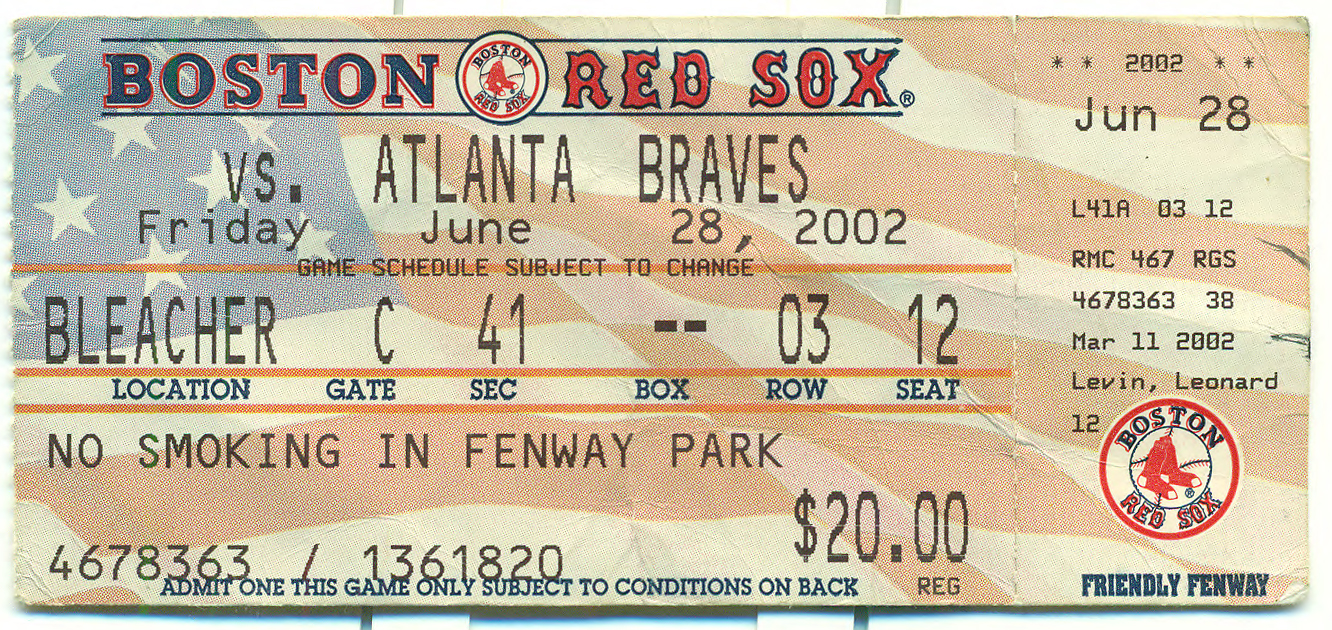June 28, 2002: SABR sees Braves continue Red Sox’s interleague misery
 A boisterous crowd of 33,137 filled Fenway Park1 on Friday evening, June 28, 2002, ready to see their homestanding Red Sox take on the Atlanta Braves, invading from the National League.
A boisterous crowd of 33,137 filled Fenway Park1 on Friday evening, June 28, 2002, ready to see their homestanding Red Sox take on the Atlanta Braves, invading from the National League.
The teams had nearly identical records at this point in the season, both 18 games over .500 and atop their respective divisions.2 But this was interleague play, and the Red Sox were having a rough June against National League opponents. Two weekends before, they had visited Atlanta and dropped the first two of three games before Derek Lowe bested Tom Glavine on June 16 in a matchup of double-digit game-winners. Boston continued a coast-to-coast road trip to San Diego and Los Angeles and lost four of six, including a three-game sweep by the Dodgers. The Red Sox had limped home and split a pair with the Cleveland Indians going into the Atlanta series.
Atlanta had been hotter. After the June 16 loss, the Braves were 7-2 against the Detroit Tigers and Chicago White Sox at home and the Mets in New York.
There were a few Braves fans scattered around Fenway that evening, but as usual the crowd was overwhelmingly Sox-oriented, attracted from every corner of Red Sox Nation for what they hoped would be a festive Friday. They were looking to see the Red Sox regain some interleague traction and remind the wandering Braves just whose city Boston was.3
Heavy rain on Thursday – enough to flood the Fenway Park dugouts and runways – had washed out the third game of the Cleveland series.4 The weather turned better on Friday and by game time it was clear and the temperature was a comfortable 81 degrees with a breeze from left field to right protecting, ever so slightly, the looming omnipresence of Fenway’s left-field Green Monster wall.
Well-traveled 37-year-old righty John Burkett retired the Braves in order in the top of the first inning with a popout and two swinging strikeouts. Braves starter Greg Maddux, somewhat hobbled by a strained left calf,5 had a more interesting first inning. With one out, the crafty righty allowed back-to-back singles to Carlos Baerga and Nomar Garciaparra, then picked Baerga off second base with Manny Ramirez at the plate. Ramirez then grounded into a force out to end any threat.
Atlanta opened the scoring in its third. Darren Bragg,6 getting one of only 39 starts he had in 109 game appearances in 2002, walked to lead off, then hustled to third on a hit-and-run single by Henry Blanco. Off on contact, Bragg scored as the next hitter, Keith Lockhart, grounded into a 4-6-3 double play. Boston got the run back in its half, as Jose Offerman walked, stole second, moved to third on an infield out, then came home as Braves third baseman Vinny Castilla threw wildly to first on Garciaparra’s groundball with two outs. The run didn’t nudge Maddux’s 3.20 ERA upward, but it counted.7
Bragg scored again for the Braves in the fifth to make it 2-1, Atlanta. Leading off, his 0-and-2-pitch smash back to the mound deflected off Burkett into the infield and Bragg reached first base safely, advancing to second base as Baerga’s throw went into the dugout. After an out, Lockhart singled Bragg home. Raphael Furcal and Julio Franco then authored banjo singles to load the bases with Gary Sheffield coming to the plate. Sheffield skied to Ramirez in left – too short for Lockhart to attempt to score. Chipper Jones ended the inning with another fly to left that Ramirez handled short of the Monster.
Maddux finished Trot Nixon, Offerman, and Johnny Damon on 13 pitches in the Boston fifth before the Braves once again loaded the bases against Burkett with two out in the top of the sixth. This time, outs separated a pair of singles. Garciaparra’s throwing error went without penalty as Furcal couldn’t deliver; he bounced to second for the third out.
Although he had thrown only 76 pitches through five innings and Atlanta had a 2-1 lead, Maddux’s stiffening calf prompted manager Bobby Cox to lift him for the sixth. With two outs, new Braves pitcher Kevin Gryboski walked Ramirez and Brian Daubach but got Shea Hillenbrand to hit into a force at third to end the half-inning. Cox’s seventh-inning pitcher, lefty Chris Hammond, fared more poorly. He allowed a leadoff single to Jason Varitek, walked Offerman with one out, and, after getting Damon to pop out in foul ground, yielded a ringing double off the base of the Green Monster by Baerga that tied the game, left runners at second and third, and denied Maddux any chance to win the game. The Red Sox appeared to be in serious business with Garciaparra up and Ramirez on deck. Pitching Garciaparra carefully, Hammond went to 3-and-0, then issued an intentional fourth ball to load the bases.
Playing by the book with the game on the line, Cox brought on right-hander Darren Holmes to face Ramirez.8 He worked the slugger to 1-and-2, then kept the ball in the park as Ramirez flied out to Chipper Jones just short of the left-field warning track.9
Red Sox manager Grady Little, who had extensive managing experience in the Braves’ minor-league system,10 replaced Burkett with former Brave Alan Embree11 for the eighth inning. The lefty got an out, then walked Bragg and Blanco back-to-back before Little brought in righty Rich Garces. The portly Venezuelan retired pinch-hitter Matt Franco but walked Furcal to load the bases and bring up Julio Franco, by any measure a truly veteran hitter.12 Garces won the battle after five pitches, inducing a roller to second base to end the half-inning.
Cox went to a fifth pitcher, lefty Mike Remlinger, for the Boston eighth. He walked leadoff pinch-hitter Rickey Henderson, but struck out Hillenbrand and got Varitek to hit into a 6-3 double play. It was still tied at 2 apiece.
Atlanta had left 12 runners on base through eight innings.13 “You can’t leave that many men on base and win many games,” Chipper Jones said after the game.14 But the Braves finally scratched out another two runs in the top of the ninth against veteran knuckleballer Tim Wakefield. Leading off, Sheffield laced a line-drive double to left field. He stayed there as Wakefield returned to his usual baffling form and retired both Chipper and Andruw Jones on flies to center. But Castilla, next up, dumped Wakefield’s first pitch safely into short center, scoring Sheffield. Bragg, reaching base for the fifth time, walked again before Blanco plopped another knuckleball into no-man’s land in short right field to bring Castilla home. Wakefield regrouped from his trial by blooper to fan Jesse Garcia, who had entered the game at second base. The bleeding had stopped, but it was 4-2, Atlanta.
And it ended that way. Braves closer John Smoltz15 retired the Red Sox in order in the bottom of the ninth on 10 pitches for his 26th save of the season, nailing down the win for Remlinger. Wakefield, whose dancing knuckleball was often masterful against hitters who didn’t see the pitch that often, had allowed the Braves just enough soft, seeing-eye contact to take the tough loss.
Non-Sox fans had encountered frenzied Boston diehards on the subway trip to Fenway; now, after the game, the mood was quiet, verging on edgy, for those who had just seen their heroes lose a game they could easily have won with more timely hitting and better luck for Wakefield. The Red Sox were saddled with their 11th loss in 16 interleague games for the season and, as the Yankees beat the Mets in New York, dropped out of first place in the AL East. They never reached even as much as another tie for first in 2002 and finished second. The Braves rolled on, winning 101 games and the NL East.
As was their flawed tendency, though, throughout their magnificent 1991-2005 run in which they dominated 14 regular National League seasons, Atlanta faltered in the playoffs, dropping the 2002 National League Division Series to the San Francisco Giants, three games to two.
Postscript
The paths of the Red Sox and Braves have diverged since that night in Boston. Although the 2002 Red Sox fell short of the American League East pennant by 10½ games to their historic rival Yankees and failed to qualify for the playoffs, they won a creditable 93 games in the process. Two years later, they won their first World Series in 86 years.
In contrast, after the Braves dropped their 2002 National League Division Series, they tormented their fans with four more years of first-round playoff losses. From 1991 through 1996 the team was always in the playoffs and in the World Series four times – Atlanta won it in 1995 – but postseason frustration set in through the rest of the divisional run, which ended in 2005.
Author’s note
A trip to this game was one of the centerpieces of the 2002 SABR convention in Boston; as a convention attendee I was there, via the MBTA subway Green Line from Arlington Station near the convention’s Park Plaza Hotel, enjoying my first trip to Fenway Park. SABR’s presence was made known to Red Sox Nation when Society President Claudia Perry delivered the ceremonial first pitch and member Joe Mancuso sang the national anthem.
As a Braves fan among the Red Sox faithful – one of them, my SABR pal Mel Poplock – sitting beside me in upgraded lower third-base-side seats we had purchased in anticipation of a visit to historic Fenway, I naturally enjoyed the game outcome, the chance to see Greg Maddux pitch, and the contributions of Darren Bragg.
Sources and acknowledgements
In addition to the sources cited in the Notes, I used the Baseball-Reference.com and Retrosheet.org websites for the box scores noted below, team and player pages, and day-by-day logs. The essays and observations in The Fenway Project (edited by SABR’s Bill Nowlin and Cecilia Tan and published in 2004 by Rounder Books, Cambridge, Massachusetts) were useful in taking me back to that night. Joe Mancuso was kind enough to promptly reply to my email about his performance of the national anthem.
https://www.baseball-reference.com/boxes/BOS/BOS200206280.shtml
https://www.retrosheet.org/boxesetc/2002/B06280BOS2002.htm
Notes
1 Fenway Park’s seating capacity for night games is 37,755. See MLB.com/redsox, accessed July 10, 2018.
2 The Braves were 6½ games up in the National League East. The Red Sox were tied with the Yankees for first place in the American League East.
3 The Braves had begun existence in Boston as the Red Stockings, an original National League franchise, in 1876. They played there under various names continuously through 1952, when they departed for Milwaukee. That sojourn lasted through 1965. The Atlanta Braves became the first major-league franchise in the Southeast in 1966. The Boston Americans debuted as a charter American League franchise in 1901 and played under that name through 1907. They became the Red Sox in 1908.
4 Tom Yantz, “Red Sox Notebook,” Hartford Courant, June 28, 2002: C-6; see also AP photo cutline, “Water Logged,” Reno (Nevada) Gazette, June 28, 2002: 16.
5 David Heuschkel, “Sox Out of Their League,” Hartford Courant, June 29, 2002: C-2, C-5.
6 Bragg had been the Red Sox’ everyday center fielder in 1997 and right fielder in 1998, so he was intimately familiar with the unique angles in the Fenway outfield. Having the luxury of the designated hitter in an AL ballpark, manager Bobby Cox slotted Bragg in right field in place of the regular, Gary Sheffield, and used Sheffield at DH.
7 The 3.20 ERA became 3.02 as Maddux left the game. This unearned run was the only one he surrendered.
8 Ramirez had missed 39 games from May 11 through June 25 with a fractured left index finger. “Sox May Be Able to Withstand Ramirez Injury,” Hartford Courant, May 14, 2002: C-5. He had picked up right where he left off. He was hitting .364 with an OPS of 1.131 going into this game. Maddux had handled him successfully twice on groundballs; Gryboski had walked him. But Holmes wasn’t Maddux, after Baerga’s double the Monster had been breached, and Ramirez was “due.” For Braves fans, this was indeed a big out.
9 Heuschkel. When Vinny Castilla arrived for 2002, the incumbent third baseman, Chipper Jones, moved to left field.
10 Little left the Braves for the Cleveland Indians organization in 2000. He had stints as interim manager there in both 2000 and 2001, then signed as Boston manager for the 2002 season.
11 Embree had pitched for Atlanta in 1997 and 1998. The Red Sox had acquired him five days earlier from the San Diego Padres.
12 Julio Franco, 43, was playing in his 1,976th major-league game.
13 The Braves stranded two more in the ninth inning for a total of 14. Boston left eight runners on base.
14 Howard Ulman, Associated Press, “Castilla, Blanco Drive in Winning Runs for Atlanta,” Asheville (North Carolina) Citizen-Times, June 29, 2002: 21.
15 Smoltz had won in excess of 10 games each season (24 in 1996) in 10 of 11 seasons from 1989 through 1999 as a starting pitcher, but suffered a torn ligament in his throwing elbow in spring training, 2000. Ben Walker, AP, “Smoltz Likely to Miss All of 2000,” Ithaca (New York) Journal, March 9, 2000: 4-B. He did miss the entire season and pitched mainly as a set-up man on his return in 2001. By 2002, however, he had displaced the mercurial John Rocker as the Braves’ closer and saved 55 games to lead the National League. He continued as a successful closer in 2003 and 2004, then returned to the starting rotation in 2005, leading the National League in starts (35) and wins (16) in 2006. Smoltz was inducted into the Baseball Hall of Fame in 2015. Those at Fenway Park that night got to see six other future Hall of Famers. Atlanta’s starter, Greg Maddux, was inducted in 2014. Another Brave in the dugout for this game, Tom Glavine, entered the Hall with Maddux in 2014. Manager Bobby Cox was yet another member of the 2014 Hall of Fame class, and Chipper Jones was inducted in 2018. Two more players destined for Cooperstown were in the Red Sox dugout – Rickey Henderson (2009) and Pedro Martinez (2015).
16 Atlanta put together an impressive 92-70 season in 2018 and won the National League East by eight games. Once again, though, they sputtered in the playoffs, eliminated by the Los Angeles Dodgers, three games to one, in the Divisional Series.
Additional Stats
Atlanta Braves 4
Boston Red Sox 2
Fenway Park
Boston, MA
Box Score + PBP:
Corrections? Additions?
If you can help us improve this game story, contact us.



